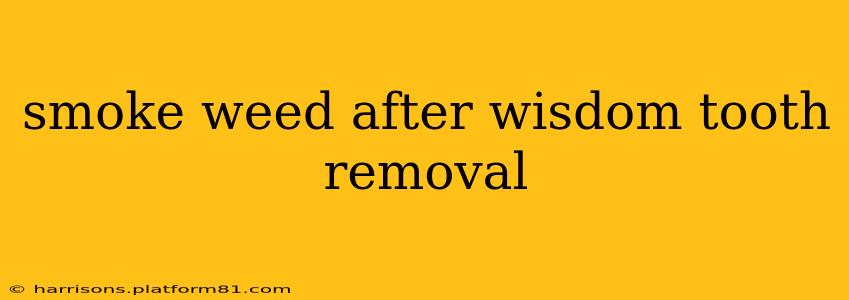Should You Smoke Weed After Wisdom Tooth Removal? A Comprehensive Guide
Having your wisdom teeth removed is a significant oral surgery, and your recovery is paramount. Many people wonder about the effects of smoking weed after this procedure, and the answer is complex. Simply put: no, you should not smoke weed after wisdom tooth removal. There are several compelling reasons why, and understanding these reasons is crucial for a smooth and complication-free recovery.
This guide will address common questions and concerns surrounding cannabis use post-wisdom tooth extraction, offering informed advice to help you prioritize your oral health.
Why is smoking weed after wisdom tooth removal a bad idea?
Smoking anything after a wisdom tooth extraction is strongly discouraged by dentists and oral surgeons. The act of smoking involves inhaling and exhaling, creating suction in your mouth. This suction can dislodge the blood clots that form in the extraction sites, leading to a serious complication called dry socket.
Dry socket (alveolar osteitis) is excruciatingly painful. It occurs when the protective blood clot is lost, exposing the underlying bone and nerves. This can prolong healing, increase the risk of infection, and necessitate further medical intervention. The pain is intense and often requires professional treatment.
What are the other risks of smoking weed after wisdom tooth extraction?
Beyond the risk of dry socket, smoking weed post-surgery presents additional concerns:
- Increased bleeding: Cannabis can act as a blood thinner, potentially leading to increased bleeding at the extraction sites. This can delay healing and necessitate additional interventions to control the bleeding.
- Impaired healing: The body needs time to heal properly. Cannabis can interfere with this process, potentially slowing down the healing of the extraction sites.
- Infection: Smoking, regardless of what you're smoking, introduces foreign particles and irritants into your mouth, increasing the risk of infection. A compromised immune system from surgery makes this risk even greater.
- Medication interactions: If you're prescribed pain medication, there's a risk of adverse interactions with cannabis, leading to unforeseen side effects. Always consult your doctor or dentist before mixing medications.
What are the alternatives to smoking weed for pain relief?
If you are experiencing pain after wisdom tooth removal, there are safer and more effective alternatives to smoking weed:
- Prescription pain medication: Follow your dentist's or oral surgeon's instructions carefully for prescribed pain relievers.
- Over-the-counter pain relievers: Ibuprofen or acetaminophen can help manage mild to moderate pain. Always follow the recommended dosage.
- Ice packs: Applying ice packs to your cheeks can reduce swelling and pain.
- Saltwater rinses: Rinsing your mouth with warm salt water can help keep the extraction sites clean and promote healing.
- Rest: Adequate rest is crucial for healing. Avoid strenuous activities and get plenty of sleep.
How long should I wait before smoking weed after wisdom tooth removal?
It's best to completely avoid smoking weed for at least a week, and preferably longer, after your wisdom tooth extraction. Even then, it's crucial to monitor your healing progress and consult with your dentist before resuming smoking. This timeframe allows for proper blood clot formation and initial healing.
Can edibles be a better option than smoking?
While edibles avoid the direct inhalation risks, they still carry the potential for increased bleeding and interaction with other medications. It's best to discuss any cannabis use, including edibles, with your doctor or dentist before considering them, particularly during the healing process following oral surgery.
What should I do if I experience dry socket?
If you suspect you have dry socket, contact your dentist or oral surgeon immediately. This condition requires professional intervention to manage the pain and prevent further complications. Don't delay seeking help if you experience severe pain, especially if it's accompanied by a bad taste or odor.
In conclusion, prioritizing your oral health after wisdom tooth removal is paramount. While cannabis may seem like a quick solution for pain relief, the risks of smoking—or even consuming edibles—significantly outweigh the benefits. Opt for safer, recommended alternatives to ensure a smooth and complication-free recovery. Always consult your dental professional for personalized advice and guidance.
